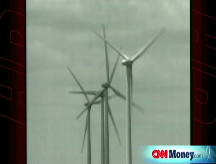Oil soars to settle above $133
Futures surge after a government report shows a surprise drop in crude and gasoline stockpiles.
NEW YORK (CNNMoney.com) -- Oil prices hit a fourth straight closing record Wednesday - shooting over $133 a barrel - after the government said crude and gasoline stockpiles decreased last week, surprising analysts who were expecting an increase.
U.S. light crude for July delivery settled at $133.17 a barrel, up $4.19, on the New York Mercantile Exchange. Prior to the 10:30 a.m. ET report, oil was down 29 cents to $128.69.
Over the last four days, oil has gained more than $9 per barrel.
"There is a tremendous amount of fear and greed driving this market," said Stephen Schork, publisher of industry newsletter The Schork Report. "This is a runaway train. I don't think the fundamentals justify the runup."
Earlier Wednesday, oil prices soared past $130 a barrel for the first time amid continuing supply concerns and a weakening dollar. The contract retreated just before the government data were released.
In its weekly inventory report, the U.S. Energy Information Administration said crude stocks fell by 5.4 million barrels last week. Analysts expected crude oil stocks to be up 900,000 barrels, according to a survey from Platts, an energy research firm.
Weather along the Gulf of Mexico's coast contributed to the shortfall, according to analysts.
"It has been really difficult to get oil into the Gulf Coast [refineries]," said Phil Flynn, senior market analyst at Alaron Trading."We have seen a lot of fog cloaking the shipping channels."
At 320.4 million barrels, U.S. crude oil inventories are in the middle of the average range for this time of year.
Refineries pumped up to operate at 87.9% of their operable capacity last week. That was above the 86.6% in the prior week and the 87.2% analysts were expecting.
The fact that refinery production jumped up last week contributed to the decrease in stockpile of crude oil, according to Flynn.
Refineries are still operating below seasonal norms, however. Memorial Day kicks off the unofficial start of the summer driving season and experts say refineries should be operating at about 90% capacity right now.
Gasoline supplies fell by 800,000 barrels, and are in the lower half of the average range. Analysts were looking for gasoline stocks to be up by 500,000 barrels.
Distillates, used to make heating oil and diesel fuel, increased by 700,000 barrels, and are in the lower half of the average range for this time of year. Analysts were looking for distillates stocks to be up by 1.45 million barrels.
The increase in distillates and the decrease in gasoline stockpiles means that refineries are more concerned with making distillates than gas, as has been the trend. Refineries do not have the financial motivation to make gas - it is just not profitable enough, according to Flynn.
Gasoline demand has averaged 9.3 million barrels per day, down by 0.4% from the same period last year, according to the government report. Refiners are not making gas because there is less demand for gas and because the global demand for diesel has made diesel more profitable than gas, said Flynn.
The June contract expired Tuesday with crude settling at at the then record high of $129.07 a barrel, up $2.02 from Monday's closing price of $127.05 a barrel.
"Once again, there was no individual news item that caused this rally - this is a continuation of this bull move," said Andrew Lebow, senior broker at MF Global.
With oil in uncharted territory, analysts have been hesitant to predict what will happen next. Yet some say the rally won't last forever, and Wednesday's price runup could be inflated by the upcoming Memorial Day weekend.
"It's not uncommon for this market to sell off the week after Memorial Day," said Mark Waggoner, president of Excel Futures in California.
In the meantime, the real crunch may be on consumers who have to deal with the rising cost of refined fuel, which tends to follow oil prices.
In the past year, crude oil prices have more than doubled, pushing retail gas prices along the same curve.
"If you don't get a break in crude oil prices, you won't get a break at the pump," said Schork. "This is going to be a long, painful summer."
The price of a gallon of regular unleaded gasoline hit a record high for the 14th straight day, according to AAA's Web site.
The nationwide average for a gallon of regular unleaded rose to $3.807, up from $3.80 the previous day and up 19% from year-ago levels.
Global demand has been increasing much faster than supply. In particular, demand for diesel fuel in China, India, the Middle East and South America has made it very difficult for suppliers to keep pace.
Diesel fuel is being used for rail and truck transport and power generation in developing nations, according to Lebow.
The expanding demand for diesel has made it very hard for refineries to keep pace. "There is just not enough global diesel capacity and we have seen that all along in 2008," said Lebow.
The weakening dollar has also contributed to the rising cost of crude oil. Crude oil is traded in U.S. greenbacks across the globe, which means that a less valuable dollar sends the price of crude up.
Inflation has pushed investors to sink their dollars into commodities, such as oil, as a way to hedge against the shrinking value of their money. On Wednesday, the euro cost $1.5750, and the dollar bought ¥103.29.
The increase in the price of crude has far outstripped the price of gasoline in the past year. At the same time, global demand for distillates, which are used to make heating oil and diesel fuel, has increased the price of diesel, making it more profitable for refineries to make distillates than gas. ![]()



